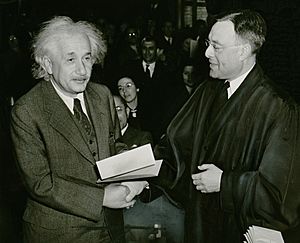Citizenship in the United States facts for kids

Citizenship in the United States means being a citizen of the United States. A person who has citizenship is called a citizen. Being a citizen means more than just living in the United States. It gives people many rights, special protections, and also some duties or responsibilities.
Contents
How to Become a US Citizen
There are two main ways people can become citizens of the United States.
Born in the US
The first way is called "birthright citizenship." If you are born in the United States, you automatically become a US citizen. It's that simple!
Becoming a Naturalized Citizen
The second way is called "naturalization." This is for people who were born outside the United States. A person becomes a naturalized citizen if they apply for citizenship and are approved by the government.
Once someone becomes a naturalized citizen, they have all the same rights, protections, and duties as someone who was born in the United States.
Steps to Naturalization
People applying to become citizens must meet certain requirements. For example, they often need to have been permanent residents (meaning they can live in the US permanently) for five years. This time can be shorter, like three years, if they are married to a United States citizen.
Applicants must also:
- Be of "good moral character." This means they haven't committed serious crimes.
- Be able to understand and speak English. (There are exceptions for older or disabled people).
- Know about the US Constitution and the US government.
- Pass a simple citizenship test.
Special Ways to Become a Citizen
- Military Service: People who serve in the US military can often become citizens faster. This is a way to thank them for their service.
- Diversity Visa Lottery: The US government has a special program called the Diversity Visa (DV) lottery. People from certain countries can apply for a chance to become a permanent resident, which can then lead to citizenship.
- Children Born Abroad: If a child is born in another country but has a parent who is a US citizen, that child can often become a US citizen too. This depends on how long the US citizen parent has lived in the United States.
What Being a Citizen Means
Being a United States citizen comes with many important things.
Your Rights as a Citizen
Being a United States citizen gives a person many rights. Here are some of them:
- Freedom to Live and Work in the US: Once you are a citizen, no one can take away your right to live in the United States. The government cannot make you leave the country, unlike non-citizens who can sometimes be deported.
- Freedom to Travel: Citizens can leave the United States for any amount of time they want. They can always come back.
- Freedom to Vote: Citizens have the right to choose their government by voting. Voting is private and fair. No one can be stopped from voting because of their race, ethnicity, skin color, home country, disability, age, gender, or the language they speak. Citizens do not have to vote, but it's an important right.
Your Duties as a Citizen
Citizenship also comes with responsibilities or duties. Here are some of those duties:
- Jury Duty: Only citizens can serve on juries. This means helping decide court cases.
- Military Service (if needed): Citizens do not have to serve in the US military today, as it is all-volunteer. However, in the past, the US has used "a draft" to call people to serve as soldiers. Male US citizens must sign up with the Selective Service System in case a draft is needed in the future.
- Taxes: All American citizens must file a federal income tax report, even if they live in other countries. US citizens pay taxes on their income no matter where they live or earn money.
- Laws and Loyalty: When a person becomes a US citizen, they take an oath. This oath means they promise to be loyal to the United States, follow its laws, and obey the Constitution.
Benefits and Protections
Citizenship also offers special benefits and protections:
- Help While Traveling: The United States has consulates or embassies in most other countries. Their job is to help American citizens who have problems when traveling. If a citizen is arrested in another country, they can ask to speak to someone from the US Embassy for advice and help.
- Sponsoring Relatives: It is easier for US citizens to help their relatives come to the United States to live.
- Protection from Deportation: Once a person becomes a naturalized US citizen, they cannot be deported (sent out of the country).
- Protection from Losing Citizenship: Once you have US citizenship, no one, not even the US government, can take it away from you. This can only happen if you ask to give up your citizenship or if you gained it illegally.
Giving Up Citizenship
Americans are allowed to formally give up their citizenship if they choose to. This is called "renouncement." Sometimes, people do this even if it means they won't have citizenship in any other country. For example, Boris Johnson, who was Prime Minister of the United Kingdom, was born in the US and was an American citizen. He gave up his American citizenship in 2016.
Images for kids
-
Male US citizens must register for the Selective Service System at age 18.
-
US citizens may be asked to serve on a jury.
-
Polish Count Casimir Pulaski was made an honorary US citizen many years after he fought in the American Revolutionary War.
See also
 In Spanish: Nacionalidad estadounidense para niños
In Spanish: Nacionalidad estadounidense para niños
 | Jackie Robinson |
 | Jack Johnson |
 | Althea Gibson |
 | Arthur Ashe |
 | Muhammad Ali |








